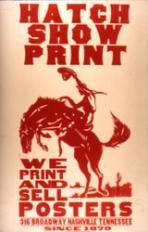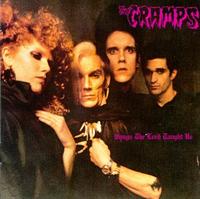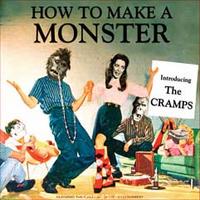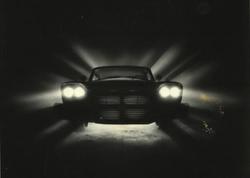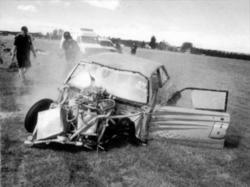« October 2004 | Main | February 2005 »
November 30, 2004
Nashville or bust! Back soon . . .
Not completely sure yet how this fits into my research project, but I'm off to Nashville next week to do an internship at Hatch Show Print. Leaving tomorrow, and getting there via LA and Vegas. (http://www.hatchshowprint.com/ . . . if you're interested)
I won't be back until the end of January, so I'm going to close off the comments options on all the posts except this one. Spam is out of control and I can't be arsed deleting the literally thousands of spam comments this site would attract until the time I get back. Anyone who really might have anything interesting to say about this blog should please leave a comment on this post (whether it relates to it specifically or to some earlier post).
Some quick things I wanted to mention before I go . . .
Camp. What exactly is 'camp'. My recent work has been called camp by an architecture student whose office is next to mine. I was of course horrified, but she's suggested I read Susan Sontag's bit on camp . . . so I'm taking that with me. When I thought about it, a lot of the monsters I like are camp (I think?) ˝ 'camp' and 'nostalgia'?
Also, when I get back, 'The Hi-Aces' are to be relaunched as 'Grand Saloon'. . . part of my plan to potentially make the band a part of my research.
So cheers, merry christmas, new years, . . .
Posted by Luke Wood at 12:54 PM
November 23, 2004
The Cramps: Songs The Lord Taught Us
"In the spring of 1976, The Cramps began to fester in a NYC apartment. Without fresh air or natural light, the group developed its uniquely mutant strain of Rock'n'Roll aided only by the sickly, blue rays of late night TV." [from liner notes to this album]
This post is more specifically about the song 'I Was A Teenage Werewolf', and about the singer, Lux Interior ˝ ". . . wherein Elvis gets crossed with Vincent Price and decent folks ask, 'what hath God wrought?'" [also from liner notes].
Lux is Elvis' twin brother Jesse, risen from the dead, the monster Elvis, the evil twin. Lux was a teenage werewolf . . . and his daddy drove a UFO. Lux is a monster in that he becomes these characters, or he is possessed by them (characters he creates take him over).
The CD version of 'Songs The Lord Taught Us' has an "original mix" of 'I Was A Teenage Werewolf' on it. Recorded live in the studio, Lux really loses himself in this performance. He growls, groans, moans, and stalks his lyrical terrain as if hypnotised or possessed . . . his performance is 'uncanny' (maybe?).
At my seminar I was asked if I wanted to create a monster, or become a monster, to try and tease out what the monster might mean in my research, where it resides.
I was thinking about how Lux Interior uses the monster as a strategy to lose his 'self', to take on a persona (schizophrenia) . . . to become someone or something else. I guess this relates to some of what I've been reading about the Surrealists and Freud, and the exploration of the subconscious. But more I was thinking about 'The Dice Man', and about how our egos, or senses of our own identities, stop us exploring certain possibilities.
The monster in this respect is like a nom de plume. Actually I guess 'Lux Interior' is exactly that. The author has more exploratory freedom through assuming an identity that is other to their everyday self.
Posted by Luke Wood at 09:58 AM
November 22, 2004
The Cramps
"We set out to become a patchwork hybrid with a life of it's own ˇ a rock'n'roll Bride of Frankenstein . . . " [from Liner notes to How to Make a Monster]
Monsters have always been a part of The Cramps. The album I was going to put on here was their first one 'Songs The Lord Taught Us', specifically for the song on it 'I Was A Teenage Werewolf', but I just came across this in Galaxy today and thought 'whoa, shit'!
The liner notes are interesting in that they are by Lux Interior and Poisin Ivy and they talk about the evolution and development of the band, or more specifically about their intentional development of a hybrid form beginning from a nostalgic impulse. The Cramps' songs are heavily loaded with references from rare, old, and obscure 45s and 78s from the 50s and 60s that Lux has collected.
"Nothing we do is meant to be a parody or campy joke . . . Humour and jive talk are undeniable aspects of our lives and subsequently our music, but we're deadly serious about everything we do. "
˝ This is interesting in relation to the John Spencer Blues Explosion . . . same thing? Kinda' sounds like they're taking the piss ˝ but they're not. They are "deadly serious". Pastiche as a strategy with which to explore a genre, or convention.
"Our intention . . . is to continue in the bigger-than-life tradition of Howlin' Wolf and Bo Diddley, who notoriously used exaggeration to intensify the truth."
˝ Is this where the monster appears? In the exaggeration? The border between fact and fiction (the uncanny)?
"If we mention monsters, we're talking about real monsters, meaning ourselves."
Posted by Luke Wood at 01:18 PM
November 19, 2004
Hayseed Dixie
This album is all AC/DC covers done bluegrass style ˝ all acoustic, banjo, fiddle, etc. It's interesting in terms of my research in that it illustrates how content can move through a conventional boundary. The content is the same but it is transformed to some extent by its application within a new set of conventions. Bluegrass is a fairly strict convention requiring particular instruments and ways of playing to actually be labled 'bluegrass' (ask Mr Bill Monroe about that!).
What I really like, and what cracks me up, about this particular mutation (if it is that?) is that while highlighting the huge differences between the original convention and the new one, it also plays on (and in fact it's effect relies on) the similarity between the specific contexts these seperate conventions inhabit. I'm talking, affectionately of course, about White Trash here. It works because AC/DC are bloody hillbillies. Or perhaps citybillies. Whatever the hillbilly became ˝ that's AC/DC. That's the mutation. The poor white working man is still the poor white working man . . . he hates his job and when the weekend rolls around he wants to drink some piss and rock out.
Does anyone remember 'Cotton Eye Joe'? Fucking awful, but same thing. Hillbilly-house music. It's funny precisely because it makes sense. The whole cubbing scene is essentially just a contemporary mutation of the hillbilly hoe-down. Poor white trash getting smashed (pills or moonshine, doesn't matter) and trying to forget how crap their daily living is.
Posted by Luke Wood at 11:51 AM
November 18, 2004
The John Spencer Blues Explosion
ýI crave the taste of blood, Good Lord Almighty, Good Lord above, My soul is lost, I said I curse the day that I ever was born.ţ [She Said, The Jon Spencer Blues Explosion]
On the 'Acme' album there's a couple of references to the name of (which is also the manifesto for) the band ˝ a 'blues explosion'. The metaphorical explosion of a convention. A convention which is primarily formulaic and that has been done to death ˝ has become a clich╚. The blues is comfort, you know where it's going, you know what to expect (partly it's charm I guess? Nostalgia). So what John Spencer aims to do is disrupt this convention, explode it, blow it apart . . . and render it new again somehow.
Their last album Plastic Fang includes a number of references to B-grade horror ˝ both through the lyrics/narrative content of the songs, and also via cover art (by Chip Kidd). I'm not sure that they're actually making an intentional link between the monsters and disruption of conventions ˝ but they might be?
Posted by Luke Wood at 10:13 AM
November 11, 2004
Collaboration and The Exquiste Corpse
This is my good friend Oscar Guerrero up at my band-room last Sunday. We played in a band together about 10 years ago and haven't really played any music together since. While our musical tastes and interests certainly overlap we're also both interested in quite different things. We got together on Sunday specifically to do some recording (The Hi-Aces still don't have a drummer and I've been itching to do 'something').
I'd been thinking about the surrealist 'Exquisite Corpse' game for a while in relation to my topic . . . when I was young my friends and I would draw superheroes and monsters and shit like that. So, basically because we only had one set of headphones, Oscar and I kind of did the same thing in terms of constructing a piece of music. It wasn't quite the same as we weren't doing it 'blind' as such, but rather I'd record a bit, pass it over to Oscar, he'd record a bit, etc etc.
The result was certainly something 'unexpected' though. I played my usual twangy-surf-country stuff, but Oscar put in this really low-dirty-muffled guitar sound with a kind of rhythym I would never have come up with. While I was surprised, I certainly didn't scare myself at any point though . . . I guess I quite liked the result.
I'm interested in trying to define whether it is 'scaring' myself exactly that I'm interested in. I guess the term 'unexpected' contains the 'scare' but not everything that's unexpected is scary . . . do I want to be surprised or scared?
Posted by Luke Wood at 12:51 PM
November 04, 2004
The Uncanny, Christine, and Frankenstein
Following Cameron's advice I've been looking into Freud's notion of the 'unheimlich' ˝ which translates (apparently only "roughly"?) as the english 'uncanny' . . . which is itself kind of difficult to define. However this problem with definition, the indescribable, is apparently an integral part of our understanding of the uncanny experience . . . "which is terrifying precisely because it cannot be adequately explained" (from http://www.engl.virginia.edu/enec981/Group/chris.uncanny.html). The uncanny derives it's terror precisely through the collision of familiarity with the inability to describe or categorise the 'thing'. This relates to my recent seminar where I discussed familiarity/comfort, and the monstrous/grotesque as a potentially disrupting factor in design process . . . the transformation of the familiar.
The image here is of Christine, the car in the movie adaptation of Stephen King's book of the same name.
According to Freud the uncanny is evoked through the collapsing of psychic boundaries between self and other, life and death, reality and unreality . . .
1. Doubt . . . as to whether an animate object is really alive; or conversely, whether a lifeless object might not in fact be animate (Freud refers to Jentsch). So borders, categories, distinctions are blurred or questioned. Christine is car, an inanimate object, a machine that can do very little without human input. However Christine does 'seem' to be doing things of 'her' own choice . . . for quite a while we are uncertain as to whether the car is alive or not. This is when the uncanny effect it as it's height, when it taps into our uncertainty. Is Dr Frankenstein's monster really alive or still kind of dead? Like a Zombie. The living dead. (The guy in the supermarket the otherday had an uncanny resemblance to Elvis Presley . . . uncanny because Elvis is supposed to be dead, but we've all heard the conspiracy theories about him faking his own death . . . but also . . . )
2.The Double. The border between the self and the other is obfuscated by the appearance of the double. Freud references Otto Rank (1914) who has discussed connections between the 'double' with REFLECTIONS in mirrors, and SHADOWS. In Mary Shelly's 'Frankenstein', the monster functions as the scientist's baser self (Aija Ozolins), Dr Frankenstein is haunted by the double's presence. Is Christine actually acting out her driver's unconscious darker self? Did Elvis' dead twin live, in spirit, through him . . . hence the contradictions that made him who he was.
The uncanny and the failure of Frankenstein . . .
". . . the Shadow diminishes as one's awareness increases. 'Freedom comes,' according to Mahoney, 'not in eliminating the shadow . . . but in recognising him in yourself' . . . His rejection of his creature is crucial . . . Frankenstein, as Philmus says, is always 'fleeing from self-knowledge,' always seeking 'to lose himself in the external world' . . ."
(Aija Ozolins, 'Dreams and Doctrines: Dual Strands in Frankenstein'. From Science Fiction Studies 2, 1975: 103˝110)
I thought maybe there was something here about recognising your mistakes?
It's interesting that Dr Frankenstein in the book flees from his monster and is horrified by it, quite a different reaction to the Dr Frankenstein of the early movie versions. I have to admit here that I haven't read Mary Shelly's book! I'll put this on my ever ballooning list of 'to reads'.
Posted by Luke Wood at 09:09 AM
November 02, 2004
All Messed Up
Anna Gerber's recent book is interesting in that it touches on much of what I've been thinking about since the GRC, but ˝ more importantly ˝ I don't think it's very successful. Following my previous post, I think I can perhaps 'use' what I see as the failure of this book to develop my own line of inquiry.
So what's wrong with "All Messed Up"?
I guess the first, most immediate, thing that bugs me about it is the way it's designed. The subtitle to the book is "Unpredictable Graphics" ˝ that unpredictable equates to 'messed up' I think is a mistake in that it seems so predictable, or obvious. The introduction text claims the benefit of error, mistake, malfunction, and chance in creative processes, and is laid out and type-set to 'look' as though errors and accidents have been left in.
I guess this comes down to intention perhaps ˝ can you make a deliberate mistake? Gerber seems to think so, ". . . work is made to look like it deliberately consists of mistakes and imperfections (ie. intentionally 'messed up) . . .". The contradiction in this is that Gerber claims the value of the error lies in it's ability to create something "unexpected". The design of this book is so familiar I'd even go so far as to call it a clich╚. The "mistakes" here look entirely fabricated, pre-planned. They don't have the quality of real errors at all ˝ they actually look (to me) like they've been put in afterwards because maybe the thing looked to tidy?
While Gerber introduces various practitioners who have attempted to utilise chance, error, and failure in their work, she fails to really unpack how these ideas operate as generative strategies within a design practice. I find her use of Ed Fella as a model for this type of practice in design problematic due to the fact that Fella's work immediately became his 'style', and as such ceased to be exploratory. Her assertion that this kind of work subverts and challenges "a perfectionist status quo", might have been true a decade ago, but it's fairly common these days for mainstream advertising to develop 'messed up' graphics for mainstream corporate clients.
Apart from this though "All Messed Up" has brought up some interesting points in relation to my topic, and I have taken a few references from it which hadn't occured to me earlier. To end this I guess I just want to reinforce (to myself!) that I think the real value of accident and failure is in leading you somewhere 'else' (and Gerber does say this too). This book and much of the work in it all seems to come from a preconceived idea (aesthetic), toward which imperfect processes are put. Error, mistakes, and failure must be able to be more useful than simply validating a desire to create messed up images? Also I don't see that "making mistakes on purpose" is essentially possible . . . an oxymoron? Perhaps in fabricating error I just feel like you're always going to know, to some extent, what to expect . . . which isn't much help if you're seeking the unpredictable.
Specific thing brought up within the book that I'd like to follow up . . .
˝ Paul Virilio: exhibition 'Unknown Quantity', and essay the 'Museum of Accidents'.
˝ Robin Kinross: 'The Uses of Failure'.
˝ 'The Art of the Accident', conference in Rotterdam 1998. Website for conference, Deaf98, was programmed to 'break down'.
˝ Surrealists: specifically Breton's interest in liberating himself from reason. 'Automatic' writing. The 'Exquiste Corpse' game.
˝ Dada, Bill Burroughs, and Brion Gysin: their interest in random constructions.
˝ John Cage and Fluxus: 'Chance Operations', questions answered by means outside of one's self . . . designing the system (or process) rather than the outcome.
˝ Brian Eno: 'Oblique strategies'
Posted by Luke Wood at 02:13 PM
Control and Failure
I used to have an old Kingswood which was quite a heavy car but it was also really fast . . . and the faster you went the lighter it got, until you'd reach a point where it would actually begin to feel like it was floating. It was at that point that you'd realise you had very little control over the thing. It was scary. It was also exciting.
Cameron said something about how it's almost impossible to scare yourself. So I've been thinking about ways you can actually scare yourself. Cameron was refering to the fright, the 'boo', the completely unexpected moment . . . that a "monster always comes from the dark", so how can we scare ourselves because we always know what's coming ˝ what to expect. I guess the car story here is about risk and fear . . . creating a dangerous situation, one you are not in control of . . . well less control of than usual. To varying degrees luck/chance come into play here. You know roughly what to expect, and you go faster and faster and faster, until chance begins to outweigh the expected.
A monster that is beyond it's master's control.
I've been looking at images of crashed hot rods lately. There's something quite beautiful about a mangled wreck (corpse) that has had so much effort, attention, and care put into it. The failure to control what you have made.
The benefit of failure is of course that you might make discoveries because of it. You might discover that a 74 Kingswood cannot take a particular corner at a particular speed . . . you might learn from this . . . and replace the suspension system so that it can. Similarly Dr Frankenstein probably learnt a lot by the failures or flaws in his monster. In this respect failure is generative, in that it invites you to explore it in order to either fix it, or possibly, use it. By 'use' I mean to actually lead you somewhere you didn't expect to go . . . that failure might set you on a new and unfamiliar path.
Posted by Luke Wood at 11:40 AM
